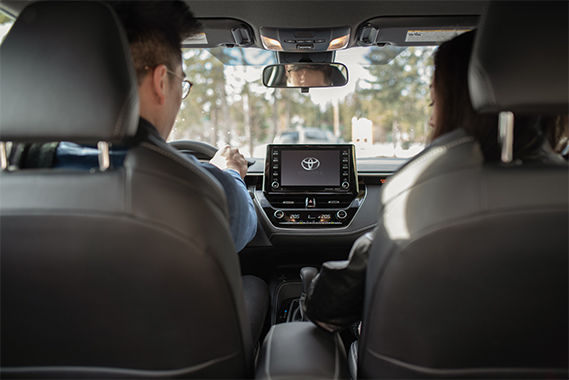Select a province & language
Entrance to this website assumes you have read and agree to these Legal Terms and Conditions and the Privacy Policy.
Entrance to this website assumes you have read and agree to these Legal Terms and Conditions and the Privacy Policy.
Just like most people use loans or mortgages when buying their homes, many people use car loans when purchasing their vehicles. And a car is a big purchase – maybe even the first large purchase you’ve considered making! So, understanding whether you should be leasing or financing your next vehicle is crucial.
But when it comes to car loans specifically, the question consumers need to ask themselves is: Am I eligible for a car loan, and where can I get a car loan?
In this article, we’ll explore all the different options to obtain car loans to help you figure out whether or not you should apply for one when buying your next vehicle.

A car loan is a contract between the lender and the purchaser of the vehicle. It is most often used when the purchaser doesn’t have enough money to pay for the vehicle in full upfront, and so they take out a loan from a lender. The loan is then paid back in specified increments of “principal” plus interest – typically in the form of monthly installments – until the buyer has paid back the amount financed plus interest in full at the end of the fixed period. At this point, the buyer then owns the vehicle. In addition to the cost of the vehicle, there is a cost of borrowing including interest and other charges.
There are many different sources for car loans: financial institutions, dealerships, or even friends and family! However, in order to successfully obtain a loan from a commercial lending establishment with a lower interest rate, you need a good credit score.
If you’d like to work with a dealership, the type of loan they offer is a financing agreement. And in order to figure out if you can get one, Toyota Financial Services can actually perform a credit check for you, which can be organized entirely online and protect your privacy. It’s a 10-minute process that asks you questions about yourself and your finances, which Toyota Financial Services uses to perform a credit check and figure out if financing is an appropriate option for you.
Now that we’ve discussed how a car loan works and how to figure out if you’re eligible for one, let’s dive into the different options for obtaining loans.

There are three popular places to get car loans: dealerships, financial institutions, and friends/family.
Getting your car financed through a dealership is an easier route than getting a traditional car loan from an outside party, as you can do everything through them! From getting pre-approved for financing to figuring out the terms of your contract to picking out your vehicle, a dealership acts as a one-stop shop for all your financing needs.
Plus, Toyota Financial Services’ incentives are offered to eligible borrowers who finance their vehicles with us. You can view all active Special Deals & Promotions here.
With financing periods of up to 84 months available, your monthly payment can be made smaller with longer terms, or you can pay higher monthly payments if you’d prefer to have a short-term contract.

Leasing is another feasible option if you cannot afford to purchase the car in full upfront. However, unlike financing a vehicle, at the end of your contract, you don’t own the vehicle.
You do have the option to purchase the vehicle at any point during the lease or at Lease End. On the other hand, you could simply turn in your vehicle or swap it in for a new lease.
People who lease vehicles generally like to drive new cars more often and want to have lower monthly payments than taking out a loan. They also may not like the idea of owning a large asset, as that means you’ll have higher maintenance fees over time when compared with the shorter time frame they’ll be using a leased car.
Whether you’re interested in leasing or financing a Toyota, we’re here to help. Toyota Financial Services offers a host of information online, and we also have articles on financing and leasing to help you further understand the differences.
Check out the Contact Us section on the Toyota Financial Services page or book an appointment at your local dealership for more information.